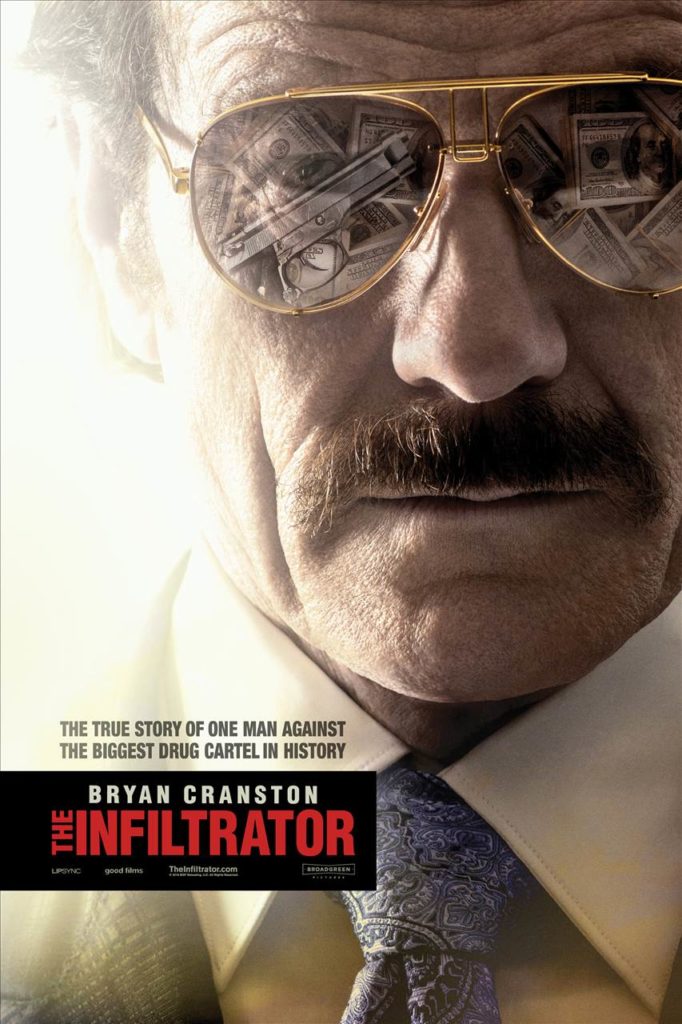 “The Infiltrator” is based on the true story of the US Customs official who helped take down a huge money laundering syndicate in the 1980s by going undercover and tracking all the Colombian drug money back and forth between Colombia and America via complicit banks set up both abroad and in America. While going undercover, though, this fella maybe starts to lose sight a little of who his friends really are and also seems to enjoy being this fake mob-associated kind of guy and also it is destroying his marriage and also he’s in a lot of danger because he got in over his head a little. But while that may seem like a lot to throw into a movie that is barely over two hours long, rest assured, it IS a lot, too much in fact, so that while this movie tries to be about a lot of things, it ends up being about nothing.
“The Infiltrator” is based on the true story of the US Customs official who helped take down a huge money laundering syndicate in the 1980s by going undercover and tracking all the Colombian drug money back and forth between Colombia and America via complicit banks set up both abroad and in America. While going undercover, though, this fella maybe starts to lose sight a little of who his friends really are and also seems to enjoy being this fake mob-associated kind of guy and also it is destroying his marriage and also he’s in a lot of danger because he got in over his head a little. But while that may seem like a lot to throw into a movie that is barely over two hours long, rest assured, it IS a lot, too much in fact, so that while this movie tries to be about a lot of things, it ends up being about nothing.
Robert Mazur (Bryan Cranston) has been going undercover for years and he’s tired of making so little progress in the war on drugs, so he convinces his bosses to allow him to take a different approach, one that we’ve all heard before in many contexts, which is to “follow the money.” By getting his foot in the door with Pablo Escobar’s people by presenting himself as a big time money launderer, he’s hoping to amass the evidence needed to find out what they do with their money, who it goes to, and how it gets back to them “clean.” He doesn’t get along with his partner Abreu (John Leguizamo) but that is an issue for all of one scene early on in the film and then they work together with no problems for the rest of the movie. So most of “The Infiltrator” is Mazur pretending to be some made up guy named Bob Musella, and he uses this alias to embed himself with the drug cartel, starting out low on their totem pole and slowly working his way up to their bigger bosses. Along the way, Mazur and Abreu are forced to involve an agent going undercover for her first time, Kathy Ertz (Diane Kruger), and the three of them work together to try to bust as many people at one time as possible.
While the basic story is quite interesting, i.e. the whole mechanics of how they got in with the low level guys and gained their trust, what they were looking for, how they got the info, recorded it, etc., all of that is genuinely interesting, but it can also all be covered in a news report or a documentary, and this is a full on crime drama, complete with intrigue and tension and betrayal, and for all of these things to come through, the characters need to be drawn out more than they are here. Outside of Mazur, no one has any real definition, no real characterization – Abreu is a bit of a loose cannon who loves his job (we know this because he yells at Mazur that he loves his job), Kathy is the newbie who can hold her own – everyone is a cipher except for Mazur.
The problem with Mazur’s characterization in “The Infiltrator” is that they tried to define him in several ways but never really hit home on any of them. First his wife accuses him of loving the undercover gig too much, meaning that he enjoys acting like a hood, but then we only get one scene in which Mazur smashes some guy’s face into a chocolate cake in order for him to prove he’s a bad ass or something, and it is literally the worst thing he does to anyone, a little cake face mashing. The idea of Mazur “losing himself” in his role is hardly explored, as he really doesn’t go far down that rabbit hole. More like he looked at the rabbit hole and sniffed at it and then moved on unchanged.
Then there is this whole thing towards the end about him gaining the trust of some of these bad guys, and feeling a little guilty about it because he’s going to have to betray them in order to finish the job. So this weighs over him for awhile, but it also doesn’t really bother him THAT much because he does continue to go through with his mission at all times, never stopping, his eyes always on the ultimate prize of the biggest bust in US Customs history. Kathy also sheds some tears about their impending betrayal, but he reassures her and of course they go through with it because that’s the point of the movie. If they wanted to make a movie about getting entwined with a criminal’s family and becoming so close to them that the idea of betrayal is so damning and unforgivable, then they should have made THAT movie, instead of making it a subplot in the final third of this one. It takes a lot more than one dinner scene to make sense of this, but “The Infiltrator” tries to get by on economy, lightly touching on these things and hoping they add up to something meaningful, which they do not.
As a result, this movie which has fine actors doing good work and perfectly capable direction simply has no drive, no “umph” to it, and instead just kind of meanders along, hitting plot points until we get to the end. The danger never feels that palpable, and when it ends, it feels kind of underwhelming. A wasted opportunity for sure.

 #324 – Fiat Entertainment
#324 – Fiat Entertainment Crespodiso Spillover Episode – News Out The Wazoo
Crespodiso Spillover Episode – News Out The Wazoo #584 – Dos Margaritas
#584 – Dos Margaritas #423 – Four Seasons Total Podcasting
#423 – Four Seasons Total Podcasting
Leave a Reply
You must be logged in to post a comment.